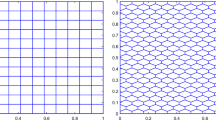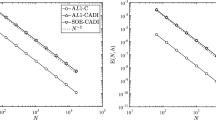Abstract
A singularly perturbed two-point boundary value problem with an exponential boundary layer is solved numerically by using an adaptive grid method. The mesh is constructed adaptively by equidistributing a monitor function based on the arc-length of the approximated solutions. A first-order rate of convergence, independent of the perturbation parameter, is established by using the theory of the discrete Green's function. Unlike some previous analysis for the fully discretized approach, the present problem does not require the conservative form of the underlying boundary value problem.
Similar content being viewed by others
References
V.B. Andreev and I.A. Savin, On the convergence, uniform with respect to the small parameter, of A.A. Samarskii's monotone scheme and its modifications, Comput. Math. Math. Phys. 35 (1995) 581–591.
G.M. Beckett and J.A. Mackenzie, Convergence analysis of finite difference approximations on equidistributed grids to a singularly perturbed boundary value problem, Appl. Numer. Math. 35 (2000) 87–109.
Y. Chen, Uniform pointwise convergence for a singularly perturbed problem using arc-length equidistribution, J. Comput. Appl. Math. 159(1) (2003) 25–34.
Y. Chen and J. Yang, Alternative convergence analysis for a convection–diffusion boundary value problem, submitted.
R.B. Kellogg and A. Tsan, Analysis of some difference approximations for a singular perturbation problem without turning points, Math. Comp. 32 (1978) 1025–1039.
N. Kopteva, Maximum norm a posteriori error estimates for a one-dimensional convection–diffusion problem, SIAM J. Numer. Anal. 39 (2001) 423–441.
N. Kopteva and M. Stynes, A robust adaptive method for quasi-linear one-dimensional convection–diffusion problem, SIAM J. Numer. Anal. 39 (2001) 1446–1467.
R. Li, T. Tang and P. Zhang, Moving mesh methods in multiple dimensions based on harmonic maps, J. Comput. Phys. 170 (2001) 562–588.
T. Linss, Uniform pointwise convergence of finite difference schemes using grid equidistribution, Computing 66 (2001) 27–39.
T. Linss, H.-G. Roos and R. Vulanovic, Uniform pointwise convergence on Shishkin-type meshes for quasi-linear convection–diffusion problems, SIAM J. Numer. Anal. 38 (2000) 897–912.
W.B. Liu and T. Tang, Error analysis for a Galerkin-spectral method with coordinate transformation for solving singularly perturbed problems, Appl. Numer. Math. 38 (2001) 315–345.
J.A. Mackenzie, Uniform convergence analysis of an upwind finite-difference approximation of a convection–diffusion boundary value problem on an adaptive grid, IMA J. Numer. Anal. 19 (1999) 233–249.
L.S. Mulholland, Y. Qiu and D.M. Sloan, Solution of evolutionary partial differential equations using adaptive finite differences with pseudospectral post-processing, J. Comput. Phys. 131 (1997) 280–298.
Y. Qiu and D.M. Sloan, Analysis of difference approximations to a singularly perturbed two-point boundary value problem on an adaptively generated grid, J. Comput. Appl. Math. 101 (1999) 1–25.
Y. Qiu, D.M. Sloan and T. Tang, Numerical solution of a singularly perturbed two-point boundary value problem using equidistribution: Analysis of convergence, J. Comput. Appl. Math. 116 (2000) 121–143.
H.-G. Roos, M. Stynes and L. Tobiska, Numerical Methods for Singularly Perturbed Differential Equations (Springer, Berlin, 1996).
G.I. Shishkin, Grid approximation of singularly perturbed elliptic and parabolic equations, Second Doctoral thesis, Keldysh Institute of Applied Mathematics, USSR Academy of Sciences, Moscow (1990).
D.R. Smart, Fixed-Point Theorems (Cambridge Univ. Press, Cambridge, 1974).
H.Z. Tang and T. Tang, Adaptive mesh methods for one- and two-dimensional hyperbolic conservation laws, SIAM J. Numer. Anal. 41 (2003) 487–515.
T. Tang and M.R. Trummer, Boundary layer resolving pseudospectral methods for singular perturbation problems, SIAM J. Sci. Comput. 17 (1996) 430–438.
R. Vulanovic, A priori meshes for singularly perturbed quasilinear two-point boundary value problems, IMA J. Numer. Anal. 21 (2001) 349–366.
Author information
Authors and Affiliations
Corresponding author
Additional information
Dedicated to Dr. Charles A. Micchelli for his 60th birthday
Mathematics subject classifications (2000)
65L10, 65L12.
This work is supported by National Science Foundation of China, the key project of China State Education Ministry and Hunan Education Commission.
Rights and permissions
About this article
Cite this article
Chen, Y. Uniform convergence analysis of finite difference approximations for singular perturbation problems on an adapted grid. Adv Comput Math 24, 197–212 (2006). https://doi.org/10.1007/s10444-004-7641-0
Received:
Accepted:
Issue Date:
DOI: https://doi.org/10.1007/s10444-004-7641-0




